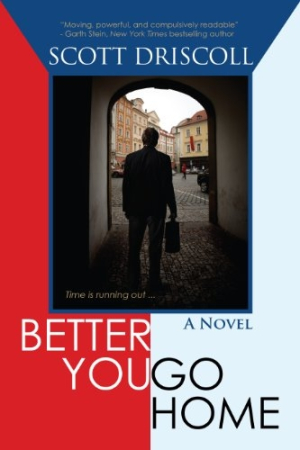Better You Go Home
Gorgeous descriptions and reflective exposition moderate the dramatic pace of this exciting international story of one family’s secretive past.
Scott Driscoll’s debut, Better You Go Home, evokes the cautious world of mid-1990s Prague and its surroundings through the eyes of a second-generation, the “progeny of exiles.” Driscoll ably threads an adulterous romance with medical urgency, post-war Czech history, and self-reckoning. This labyrinthine novel is an accomplished work that examines the fallout of the past.
The author of short stories in literary journals such as Gulfstream and Cimarron Review, Driscoll weaves a dizzying plot that shuttles between Seattle and the Czech Republic in the years after the Velvet Revolution. When forty-two-year-old Seattle lawyer Charles “Chico” Lenoch returns to the Czech Republic in search of his half-sister, who he hopes will serve as a kidney donor, he discovers family entanglements with ongoing consequences.
The pressures characters face—caused by family silences, a lifetime of enduring surveillance, and, in some cases, the consequences of either forced cooperation or dissidence in an Eastern Bloc country—bloom into a surprisingly affecting tale. Additional tension in the guise of a decades-old crime, which threatens Charles’s plans to bring his half-sister home, serves as a motivating force.
Amid the high emotional stakes that come with a health crisis, the dramatic journey to uncover truths leans toward excess. The author, however, provides reflective interludes at a Washington raptor center, which allow Charles to consider perceptions of captivity and freedom. Gorgeous, imaginative descriptions of the Czech countryside in Piséčná offer respite from the cat-and-mouse chase between Charles and local officials: “A pumpkin-colored river rolls southwest and loops around Zampach Hill. The village farmhouses string out along the river like bows on a kite tail.”
Gems such as, “When it comes to sorting out identity, it’s the memories we don’t have in common that define us,” deepen the material. Through its thoughtful exploration of a country in transition, Better You Go Home elevates the classic dilemma of whether it is necessary or even worthwhile to pay the debts of one’s forebears. Driscoll also rewardingly avoids judging his protagonist. Charles readily believes his half-sister will relinquish her life to join his own, yet his assumption remains largely unquestioned and is not tinged with a sense of American privilege. Instead, his naive optimism allows vulnerable facets of his character to emerge.
With story lines that converge in a grotesque meeting of rivals—replete with costuming and a conflagration—there’s no shortage of suspense. Beneath the theatrics, subtler, worthy themes of letting go and renewing one’s sense of purpose take hold.
Reviewed by
Karen Rigby
Disclosure: This article is not an endorsement, but a review. The publisher of this book provided free copies of the book and paid a small fee to have their book reviewed by a professional reviewer. Foreword Reviews and Clarion Reviews make no guarantee that the publisher will receive a positive review. Foreword Magazine, Inc. is disclosing this in accordance with the Federal Trade Commission’s 16 CFR, Part 255.

